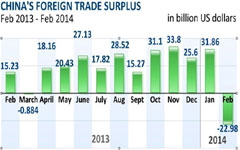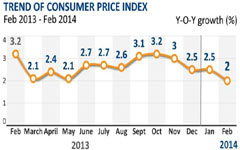Weak data prompts drop in equity prices
By Xie Yu in Shanghai (China Daily) Updated: 2014-03-11 08:57
|
 |
|
An investor checks a stock terminal at a brokerage in Fuyang, Anhui province, on Monday. The Shanghai benchmark index dropped by 2.86 percent to 1,999.07 points. LU QIHUA/CHINA DAILY |
Shanghai major index falls below the psychologically important 2,000 level
China's benchmark Shanghai Composite Index experienced a sharp drop on Monday after weak economic data triggered concerns about a worsening economic slowdown.
The benchmark index dropped by 2.86 percent to 1,999.07 points, falling below the psychologically significant 2,000 level and marking the biggest slump in at least two years. Turnover expanded to 95 billion yuan ($15.6 billion) from 89.3 billion yuan on the previous trading day.
China's CSI 300 Index slid 3.3 percent to 2,097.79, the lowest level since February 2009. The Hong Kong Hang Seng Index retreated 1.75 percent to 22,264.9.
|
 |
|
 |
Zhongzheng Investment Consulting, based in Shenzhen, said in a report on Monday: "A bunch of trust and bond products are due to mature in March. While the economic growth is appearing to slow down and debt structure twists, March may see more defaults after Chaori Solar reported the mainland's first onshore bond default, which poses risks to the stock market."
Sectors including travel and hotel, aviation and insurance fell after a Malaysian plane with 239 onboard, including 154 Chinese passengers, went missing with no explanantion forthcoming so far.
Jiangxi Copper Co and Yanzhou Coal Mining Co tumbled more than 5 percent at the close of trading. China Southern Airlines Co fell by 3.5 percent.
Analysts said weaker-than-expected export data have created challenges for China's leadership in maintaining the target of a 7.5 percent gross domestic product growth rate for this year. In addition, China's consumer prices rose at their slowest rate in 13 months in February, with pork prices falling by their most in more than a year. Meanwhile, a weakening yuan is having a negative effect on industries including mining, property development and the financial services.
China's exports sank by 19 percent from the previous year in February, much lower than the 5 percent increase that was expected by economists. It followed a healthy 10.6 percent expansion in January.
- NHTSA says finds no 'defect trend' in Tesla Model S sedans
- WTO rare earth ruling is unfair
- Amway says 2014 China sales may grow 8%
- President Xi in Europe: Forging deals, boosting business
- CNOOC releases 2013 sustainability report
- Local production by Chery Jaguar Land Rover this year
- Car lovers test their need for speed in BMW Mission 3
- China stocks close mixed Monday

















